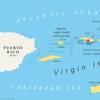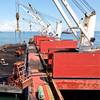Canadian Security Regs Tightened
"A secure, strong marine industry is vital to Canada's dynamic economy," said Mr. Valeri. "These regulations will surpass the International Maritime Organization requirements and help ensure that Canada's marine transportation system remains one of the most secure in the world."
The proposed amendments will implement the requirements of the International Maritime Organization's (IMO) International Ship and Port Facility Security Code, as well as amendments to its Safety of Life at Sea Convention, 1974. The IMO is a specialized agency of the United Nations which focuses on the improvement of safety at sea and the prevention of pollution from vessels.
The IMO's Security Code requires that all commercial vessels of 500 tons (gross tonnage) or more, or carrying more than 12 passengers and travelling between countries, and marine facilities serving such vessels, perform security assessments, complete security plans and designate security officers.
In addition to implementing the IMO requirements, Canada's regulations will extend these requirements to:
· port facilities in Canada;
· cargo vessels of 100 tons (gross tonnage) or more; and
· towing vessels greater than eight metres in length that tow barges carrying dangerous goods in bulk.
"The 2004 budget secured an additional $605 million over five years for security," added Mr. Valeri. "These funds will be used to address security priorities, which could include marine security enhancements at port and port facilities — a priority for the Government of Canada."
Transport Canada's latest marine security initiative builds on significant actions already taken by the Government of Canada to enhance marine security since September 11, 2001.
These actions include, among others:
· requiring vessels to provide at least 96 hours advance notice before they enter Canadian waters;
· introducing new boarding protocols to improve the response to threats before vessels arrive at Canadian marine facilities or ports;
· establishing enhanced security procedures, in partnership with the United States, for vessels entering the Great Lakes – St. Lawrence Seaway system;
· working with international partners to develop new marine international security requirements; and
· committing $172.5 million for a broad range of initiatives to enhance the security of Canada's marine transportation system and maritime borders including the use of aerial surveillance and vessel monitoring systems, such as automatic identification systems which will enhance Canada's ability to track vessels entering and operating in Canadian waters.












